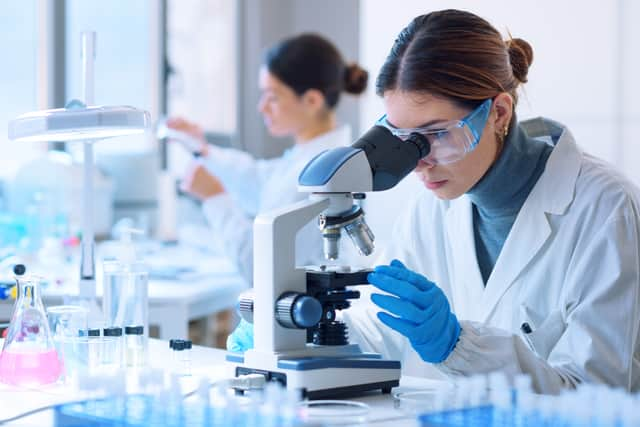New antibiotic to treat deadly superbug found using AI - and could help breast cancer fight
and live on Freeview channel 276
This article contains affiliate links. We may earn a small commission on items purchased through this article, but that does not affect our editorial judgement.
A new antibiotic that can kill a deadly type of superbug responsible for many drug-resistant infections has been identified using Artificial Intelligence (AI).
Researchers at Massachusetts Institute of Technology and McMaster University identified the drug from a library of nearly 7,000 potential drug compounds.
Advertisement
Hide AdAdvertisement
Hide AdThey used a machine-learning model that they trained to evaluate whether a chemical compound will inhibit the growth of Acinetobacter baumannii - a species of bacteria that is often found in hospitals.
In the study, published in Nature Chemical Biology, researchers say if the drug is developed for use in patients it could be used to treat the likes of pneumonia, meningitis and other serious infections.


James Collins, the Termeer Professor of medical engineering and science in MIT’s Institute for Medical Engineering and Science (IMES) and Department of Biological Engineering, said: “This finding further supports the premise that AI can significantly accelerate and expand our search for novel antibiotics. I’m excited that this work shows that we can use AI to help combat problematic pathogens such as A. baumannii.”
Scientists are working to optimise the medicinal properties of the compound, in the hope of developing it for eventual use in patients. The researchers also plan to use their modelling approach to identify potential antibiotics for other types of drug-resistant infection.
Advertisement
Hide AdAdvertisement
Hide AdAI is also being used in the fight against breast cancer, with scientists developing a model which may be able to predict whether an aggressive type of breast cancer will spread. The AI model is able to detect changes in the lymph nodes – small, bean-shaped structures that help filter cancer cells and fight infection – of women with triple negative breast cancer.
The lymph nodes under the arm on the same side as the cancer is one of the first places breast cancer can spread to and in these cases, patients are likely to need more intensive treatment.
Researchers say the ability to detect changes in the lymph nodes could help doctors plan treatment, as well as give patients peace of mind about the likelihood of triple negative breast cancer spreading.
Dr Anita Grigoriadis, who led the research at the Breast Cancer Now Unit at King’s College London, said: “By demonstrating that lymph node changes can predict if triple negative breast cancer will spread, we’ve built on our growing knowledge of the important role that immune response can play in understanding a patient’s prognosis.
Advertisement
Hide AdAdvertisement
Hide Ad“We’ve taken these findings from under the microscope and translated them into a deep-learning framework to create an AI model to potentially help doctors treat and care for patients, providing them with another tool in their arsenal for helping to prevent secondary breast cancer.”
Around one in seven (15%) of all breast cancers in the UK are triple negative, with more than 8,000 cases a year. This type of cancer does not have any of the receptors (proteins) commonly found in breast cancer and accounts for around 25% of breast cancer deaths.
Those who have inherited an altered BRCA gene, along with black women and women who have not yet reached the menopause are at higher risk of developing this type of cancer.
For the study, published in The Journal of Pathology, researchers tested their AI model on more than 5,000 lymph nodes donated by 345 patients to biobanks such as the Breast Cancer Now Tissue Bank.
Advertisement
Hide AdAdvertisement
Hide AdThe model was able to establish the likelihood of breast cancer spreading to other organs and could predict this by analysing the immune responses in the lymph nodes, even when the breast cancer cells had not spread to the organs.
Researchers now hope their AI model will be tested in clinical trials. Dr Grigoriadis added: “We’re planning to test the model further at centres across Europe to make it even more robust and precise.
“The transition from assessing tissue on glass slides under a microscope to using computers in the NHS is gathering pace. We want to leverage this change to develop AI-powered software based on our model for pathologists to use to benefit women with this hard-to-treat breast cancer.”
Dr Simon Vincent, director of research, support and influencing at Breast Cancer Now, added: “Each year around 8,000 UK women are diagnosed with triple negative breast cancer, which is a more aggressive form of breast cancer, often with poorer outcomes.
Advertisement
Hide AdAdvertisement
Hide Ad“If, thanks to this research, it’s possible to provide women with more tailored treatment and care based on the likelihood of the breast cancer spreading, it could help to save lives and reduce stress and worry.”
Comment Guidelines
National World encourages reader discussion on our stories. User feedback, insights and back-and-forth exchanges add a rich layer of context to reporting. Please review our Community Guidelines before commenting.
